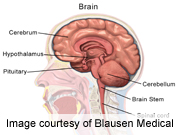
WEDNESDAY, Dec. 12 (HealthDay News) — Brain changes in children who have suffered a concussion continue to occur even after they no longer have symptoms of the injury, according to a new study.
The findings highlight the potential benefit of using advanced brain imaging techniques to monitor a child’s recovery, said Andrew Mayer and colleagues at the Mind Research Network and the University of New Mexico, in Albuquerque. The Mind Research Network is a nonprofit association that focuses on imaging technology and neuroscience.
The team looked at 15 children, aged 10 to 17, who had recently suffered a mild concussion. Structural changes seen in brain white matter about two weeks after the concussion were still evident more than three months later although the children no longer had any symptoms of their injury.
The researchers also found that the extent of white matter changes in the children was larger than what has previously been reported for adults with mild concussion. This suggests that developmental differences in the brain or the musculoskeletal system may make children more susceptible to concussion.
The study was published Dec. 12 in the Journal of Neuroscience.
“These findings may have important implications about when it is truly safe for a child to resume physical activities that may produce a second concussion, potentially further injuring an already vulnerable brain,” Mayer said in a journal news release.
Another expert said the findings mark “an important step forward” in the understanding of how concussion affects children’s brains.
“Further work is needed to determine whether the changes in white matter present at four months represent a prolonged recovery process or permanent change in the brain,” Dr. Christopher Giza, a brain injury expert at Mattel Children’s Hospital and the Brain Injury Research Center at the University of California, Los Angeles, said in the news release.
“Determining the duration of the structural changes and whether these changes have clinical implications remain critical areas for future studies,” said Giza, who was not involved in the study.
Many experts advise that any imaging of children’s brains involve the lowest dose possible of radiation or a method that doesn’t use radiation.
More information
The Nemours Foundation has more about children and concussion.

